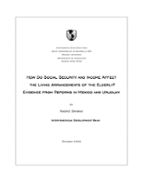How Do Social Security and Income Affect the Living Arrangements of the Elderly?: Evidence from Reforms in Mexico and Uruguay
Date
Oct 2000
It has been shown that the social security system and other sorts of government transfers have helped poor elderly people, such as widows, to live alone in the U.S. This paper investigates whether government financial support contributed to the increase in the probability of the vulnerable elderly living alone in Latin American countries as well. Specifically, the countries that in the 1980s experienced government reforms favorable to the vulnerable elderly, Mexico and Uruguay, are examined. It is concluded that the improvement of educational attainment was mainly responsible for helping the elderly poor to live alone in rural areas in Mexico, and not the government system. On the other hand, in Uruguay, for unmarried elderly females, the increase in social security income explains most of the increase in the probability of living alone.



